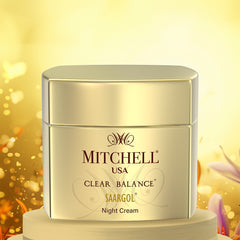After a long, exhausting day, skincare is often the last thing we think about. But experts say our night routine is crucial and shouldn't be skipped. According to dermatologists,our skin does three important things at night: it rehydrates, repairs, and renews.
Curious how this works? Let’s dive into the science behind it.
At night, our skin relaxes, and the pores open up, making it easier for products to absorb. When we apply anything,It stays away from the daily attackers like humidity, sunlight, and pollution.
But before starting a nighttime skincare routine, many people ask us different questions. We are answering them all here!
Have questions? Let’s tackle what you’re wondering about. Read the full blog and don’t forget to apply your night cream! Ready to dive in? Let’s go!
What ingredients should you look for in a night skincare cream?

Skincare is self-care, and your routine should feel as luxurious as you are! So, choose your night cream wisely. Take a moment to read the label and look for those special ingredients that will pamper your skin. Treat yourself right; your skin deserves it!

Here are some ingredients, your night cream must have:
This luxurious night cream must be packed with amazing ingredients that work together to rejuvenate your skin while you sleep. Saffron extract protects against environmental damage and promotes a youthful glow. Alpha arbutin and bearberry extract brighten the skin and reduce dark spots, giving you a more even complexion. Niacinamide improves skin texture, reduces redness, and strengthens the skin's barrier for a healthier feel. Seed butter provides deep hydration, making your skin plump and supple. Finally, quaternized soy protein hydrolysate boosts elasticity and firmness, minimizing fine lines and wrinkles. Together, these ingredients leave your skin feeling revitalized and glowing with youth.
At What age should you start using night cream?
Dermatologists recommend starting to use night creams in your 20s because, as they say, "prevention is better than cure." However, three factors can affect when you should begin: your skin type , your lifestyle, and your daily stress levels.
Your lifestyle plays a big role too—if you're often exposed to pollutants and blue light, your skin might age more quickly. Lastly, your job can impact your skin; daily stress can trigger those unwanted signs of aging. So, pay attention to these factors when deciding when to start using a night cream!
When to Apply Your Nighttime Elixir?
It's best to apply your night cream after cleansing your face, either right before bed or a few hours earlier. While your skin is still damp and soft, it's like a sponge ready to soak up the nourishing ingredients. This way, your skin can fully absorb the rejuvenating benefits and awaken refreshed and radiant in the morning.
How do you apply a night cream?
- Begin by washing your face with a mild cleanser to remove dirt and impurities.
- Gently pat your face dry with a soft towel, leaving your skin slightly damp.
- Scoop a small amount of night cream onto your fingertips and massage it evenly into your skin, paying attention to dry areas.
- Allow the cream to absorb into your skin before going to bed.
Do you want to refine your skin texture?Would you like it to feel smoother and softer?Click the link below and give your skin the superpower it needs at night!




